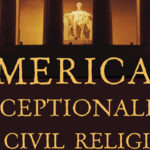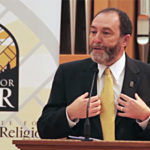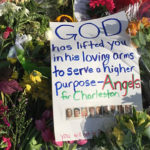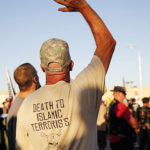WASHINGTON (ABP) — U.S. foreign policy is hampered by a secular bias that causes policy makers to underestimate the role of religion in world affairs, a Midwestern think tank said in a 100-page report released Feb. 23.
A task force convened by the Chicago Council on Global Affairs recommended engaging religious communities instead "an uncompromising secular political alternative" that now characterizes the United States' approach to international affairs.
The 32-member task force — co-chaired by Notre Dame professor Scott Appleby and Richard Cizik, president of the New Evangelical Partnership for the Common Good — said ignorance about religion is a blind spot that inhibits "smart thinking" about U.S. decisions concerning foreign aid, building relationships with nations and tackling multi-national challenges like climate change, fighting disease and advancing human rights.
For example, the report said, Al Qaeda in Iraq bombed a Shia Islam holy site in 2006 to provoke religious conflict in Iraqi society along already strained religious lines. Preoccupied with strategic operations against insurgents and terrorists, U.S. leaders almost entirely ignored the incident and did not grasp its significance until about four-and-one-half months later.
The task force said the influence of religious groups is growing in many parts of the world, affecting virtually all sectors of society from politics and culture to business and science. Since 9/11, however, U.S. foreign policy has viewed religion as a problem in the area of terrorism and not as a potential source of creativity, inspiration and commitment to resolve conflict.
The task force suggested a better way of "authentic engagement" with religious leaders and communities that does not focus solely on the fault line between Christians and Muslims. The rise of Pentecostal Christianity in Latin America and growth of Christian churches in Africa and Asia, for example, are important religious developments that should not be ignored.
The report said ignoring or trying to isolate religious actors in world affairs often has the unintended effect of feeding extremism fueled by personal, cultural and religious identity. It said the U.S. would be better off to support and empower progressive and benevolent elements within societies and cultures shaped by religion.
"Religious activism was behind the September 11 attacks, but also the fall of the Berlin Wall," the report said. "It fuels bloody communal conflict in Bosnia and Sudan, but also peace and forgiveness in South Africa and Northern Ireland. It has motivated the politics of Osama bin Laden and violent Hindu nationalists, but also of Pope John Paul II and the Dalai Lama. It is pivotal to the fate of Afghanistan, India, Iraq, Iran, Nigeria, Pakistan, Yemen and many other locales where the United States has vital foreign policy interests."
The task force said globalization has had a positive effect on religious revival around the world, but it has also fueled fear, resentment and opposition in countries where globalization is seen as "Americanization," an unacceptable intrusion on religious, social, cultural and national identities.
Sign up for our weekly edition and get all our headlines in your inbox on Thursdays
For that reason, the task force said, the U.S. should take care to avoid actions that use or appear to use religion "instrumentally" by trying to manipulate religion in pursuit of narrowly drawn interests.
The group said most of today's wars and conflicts do not rise directly from theological disputes within or across religious boundaries, but religion lends a "sacred aura and intensity" when religious actors inspire violence by framing it as an act of justice. Because Western powers understand religion so poorly, they sometimes escalate tensions unintentionally in ways such as identifying sympathetic clerics as "moderates," a label seen by some as a synonym for lackeys of the United States.
Even U.S. promotion of human rights, the task force said, is sometimes misunderstood as imposition of Western imperialism or a Christian crusade. The role of women in society is particularly vexing, the group said, because advancing women's rights can also challenge existing social structures and local and religious traditions.
"The challenge for the United States is to understand and present human rights as a global rather than a solely Western value," the report recommended. "Communities and cultures around the world, each in their own ways, have the potential to affirm the canon of human rights and recognize it as their own. Accordingly, the United States must recognize that human rights can be implemented effectively and robustly only in a manner consistent with different traditions and beliefs."
The task force said one problem facing U.S. foreign policy is uncertainty about how the First Amendment, which prohibits the government from establishing religion in the United States, applies to other countries. Some find it hard to accept that religion belongs in policy discussions in a secular and democratic state.
"The challenge before us is to marginalize religious extremists, not religion," the task force said. "Especially where religious extremism is a central factor in a conflict or the political landscape, it is all the more important that there be more tolerant religious voices that can counter the extremists and provide alternative views from within their own tradition."
"Promoting an uncompromising Western secularism as a solution to religious extremism can have the unintended effect of feeding extremism by further threatening traditional sources of personal, cultural and religious identity," the report continued. "Contra the secularists, the best way to counter extremist religion is with religion that is civil and public, not weakened or privatized."
–Bob Allen is senior writer for Associated Baptist Press.














We seek to connect God’s story and God’s people around the world. To learn more about God’s story, click here.
Send comments and feedback to Eric Black, our editor. For comments to be published, please specify “letter to the editor.” Maximum length for publication is 300 words.